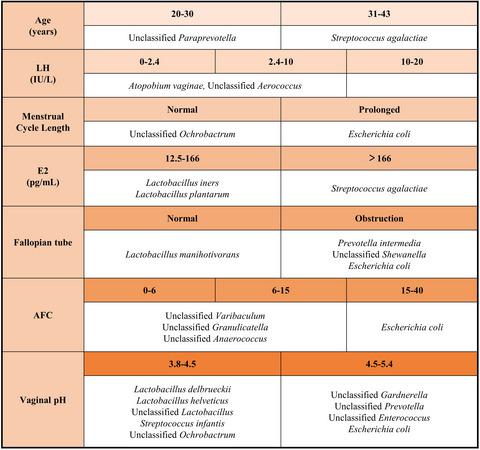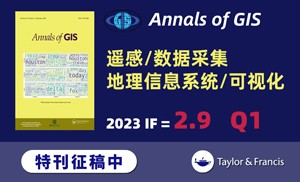当前位置:
X-MOL 学术
›
Am. J. Reprod. Immunol.
›
论文详情
Our official English website, www.x-mol.net, welcomes your
feedback! (Note: you will need to create a separate account there.)
Fertility factors affect the vaginal microbiome in women of reproductive age.
American Journal of Reproductive Immunology ( IF 2.5 ) Pub Date : 2020-01-21 , DOI: 10.1111/aji.13220 Jieying Xu 1, 2 , Gaorui Bian 3 , Min Zheng 1, 2 , Gang Lu 4, 5 , Wai-Yee Chan 4, 5 , Weiping Li 1, 2 , Kaiping Yang 3, 6 , Zi-Jiang Chen 1, 2, 5 , Yanzhi Du 1, 2
American Journal of Reproductive Immunology ( IF 2.5 ) Pub Date : 2020-01-21 , DOI: 10.1111/aji.13220 Jieying Xu 1, 2 , Gaorui Bian 3 , Min Zheng 1, 2 , Gang Lu 4, 5 , Wai-Yee Chan 4, 5 , Weiping Li 1, 2 , Kaiping Yang 3, 6 , Zi-Jiang Chen 1, 2, 5 , Yanzhi Du 1, 2
Affiliation

|
PROBLEM
For women of reproductive age, achieving a successful pregnancy requires both the normal functioning of reproductive endocrine and the health of the reproductive tract environment. We aimed to study how these fertility factors, such as female age, baseline sexual hormone levels, tubal patency, and vaginal pH, affect the composition of vaginal microbiome.
METHOD OF STUDY
The 16S rRNA sequencing was carried on vaginal microbiome samples from 85 women of reproductive age without vaginal infections or reproductive endocrine diseases. The detailed correlations between fertility factors and vaginal microbiome were quantified by Spearman's rank tests. A linear discriminant analysis was carried out to explore the effects of fertility factors on the relative abundances of vaginal bacterial species.
RESULTS
The vaginal pH, levels of basal E2, LH, and FSH all had significant effects on the distribution of vaginal microbiome. The relative abundances of vaginal bacterial species, including Escherichia coli, Streptococcus agalactiae, and Prevotella intermedia, were significantly different due to the host's state of reproductive endocrine and tubal patency. It was worth noting that women with tubal obstruction, or prolonged menstrual cycle, or antral follicle count >15, or vaginal pH > 4.5 all had a higher abundance of Escherichia coli in vagina.
CONCLUSION
The fertility factors associated with the reproductive endocrine and the genital tract environment affected vaginal microbiome in women of reproductive age. The species Escherichia coli, Streptococcus agalactiae, Prevotella intermedia, etc could be used as biomarkers to reflect the pathological state of reproductive endocrine and genital tract.
中文翻译:

生育因素影响育龄妇女的阴道微生物组。
问题对于育龄妇女,成功怀孕需要生殖内分泌的正常功能和生殖道环境的健康。我们旨在研究这些生育力因素,例如女性年龄,基线性激素水平,输卵管通畅性和阴道pH值,如何影响阴道微生物组的组成。研究方法对来自85名没有阴道感染或生殖内分泌疾病的育龄妇女的阴道微生物组样本进行16S rRNA测序。生育因子与阴道微生物组之间的详细相关性通过Spearman等级检验进行量化。进行线性判别分析以探讨生育因子对阴道细菌种类相对丰度的影响。结果阴道pH值,基础E2水平,LH和FSH均对阴道微生物组的分布有显着影响。由于宿主的生殖内分泌状态和输卵管通畅状态,包括大肠杆菌,无乳链球菌和中间普氏杆菌在内的阴道细菌种类的相对丰度显着不同。值得注意的是,输卵管阻塞,月经周期延长或肛门卵泡计数> 15或阴道pH> 4.5的女性阴道中的大肠杆菌含量较高。结论与生殖内分泌和生殖道环境有关的生育因素影响了育龄妇女的阴道微生物组。大肠杆菌,无乳链球菌,中间小球藻,
更新日期:2020-03-30
中文翻译:

生育因素影响育龄妇女的阴道微生物组。
问题对于育龄妇女,成功怀孕需要生殖内分泌的正常功能和生殖道环境的健康。我们旨在研究这些生育力因素,例如女性年龄,基线性激素水平,输卵管通畅性和阴道pH值,如何影响阴道微生物组的组成。研究方法对来自85名没有阴道感染或生殖内分泌疾病的育龄妇女的阴道微生物组样本进行16S rRNA测序。生育因子与阴道微生物组之间的详细相关性通过Spearman等级检验进行量化。进行线性判别分析以探讨生育因子对阴道细菌种类相对丰度的影响。结果阴道pH值,基础E2水平,LH和FSH均对阴道微生物组的分布有显着影响。由于宿主的生殖内分泌状态和输卵管通畅状态,包括大肠杆菌,无乳链球菌和中间普氏杆菌在内的阴道细菌种类的相对丰度显着不同。值得注意的是,输卵管阻塞,月经周期延长或肛门卵泡计数> 15或阴道pH> 4.5的女性阴道中的大肠杆菌含量较高。结论与生殖内分泌和生殖道环境有关的生育因素影响了育龄妇女的阴道微生物组。大肠杆菌,无乳链球菌,中间小球藻,









































 京公网安备 11010802027423号
京公网安备 11010802027423号